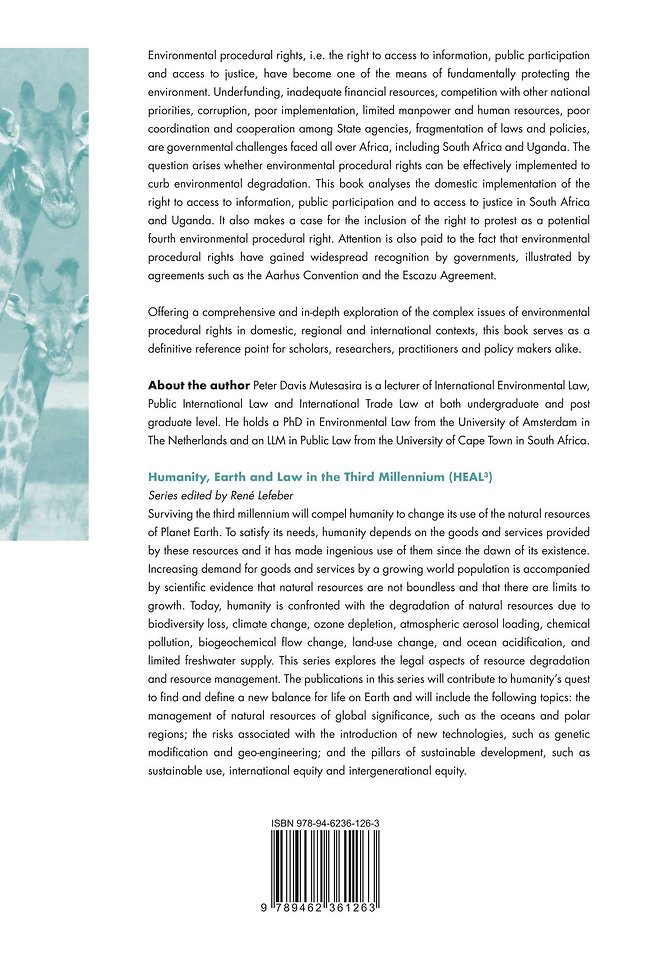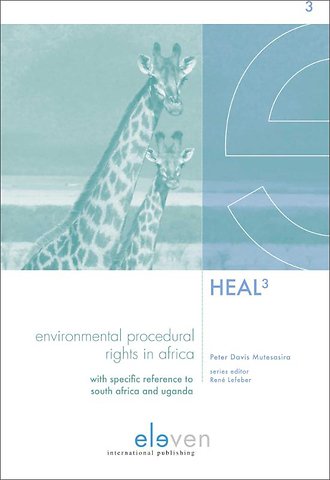Environmental Procedural Rights in Africa
With Specific Reference to South Africa and Uganda
Samenvatting
Environmental procedural rights, i.e. the right to access to information, public participation and access to justice, have become one of the means of fundamentally protecting the environment.
Underfunding, inadequate financial resources, competition with other national priorities, corruption, poor implementation, limited manpower and human resources, poor coordination and cooperation among State agencies, fragmentation of laws and policies, are governmental challenges faced all over Africa, including South Africa and Uganda. The question arises whether environmental procedural rights can be effectively implemented to curb environmental degradation.
This book analyses the domestic implementation of the right to access to information, public participation and to access to justice in South Africa and Uganda. It also makes a case for the inclusion of the right to protest as a potential fourth environmental procedural right. Attention is also paid to the fact that environmental procedural rights have gained widespread recognition by governments, illustrated by agreements such as the Aarhus Convention and the Escazu Agreement. Offering a comprehensive and in-depth exploration of the complex issues of environmental procedural rights in domestic, regional and international contexts, this book serves as a definitive reference point for scholars, researchers, practitioners and policy makers alike.
About the author Peter Davis Mutesasira is a lecturer of International Environmental Law,
Public International Law and International Trade Law at both undergraduate and post
graduate level. He holds a PhD in Environmental Law from the University of Amsterdam in
The Netherlands and an LLM in Public Law from the University of Cape Town in South Africa.
Specificaties
Inhoudsopgave
Part I: Background and Introduction
Chapter 1: Introduction 3
1.1. Introduction 3
1.2. Conceptual Aspects of Environmental Rights 6
1.2.1. The Biocentric/Ecocentric Approach 6
1.2.2. The Anthropocentric Approach 8
1.2.3. The Classification of Rights 10
1.2.4. The Duty to Respect, Protect and Fulfil 12
1.2.5. Environmental Rights as Procedural Rights 14
1.2.6. Environmental Rights as Rights of Future Generations 15
1.2.7. Environmental Rights as Rights of the Environment 17
1.3. Statement of the Problem 17
1.4. The Aims and Objectives 19
1.5. Scope 20
1.6. Chapter Synopsis 20
1.7. Methodology 21
Chapter 2: The Concept of Environmental Procedural Rights – An
Overview 23
2.1. Introduction 23
2.2. Environmental Procedural Rights 23
2.2.1. The Right of Access to Information 24
2.2.2. The Right of access to Public Participation 34
2.2.3. The Right to Protest 43
2.2.4. The Right of Access to Justice 52
2.3. Conclusion 59
Chapter 3: Background to the Evolution of Environmental Procedural Rights 61
3.1. Introduction 61
3.2. The International Arrangements 61
3.2.1. Universal Declaration on Human Rights (UDHR) 61
3.2.2. International Covenant on Civil and Political Rights 64
3.2.3. International Covenant on Economic, Social and Cultural Rights 71
3.2.4. The Stockholm Declaration on the Human Environment 74
3.2.5. The World Charter for Nature 76
3.2.6. The Rio Declaration on Environment and Development 78
3.2.7. Agenda 21 81
3.2.8. The United Nations Environment Programme (UNEP) Guidelines for the Development of National Legislation on Access to Information, Public Participation and Access to Justice in Environmental Matters 83
3.3. Regional Arrangements 87
3.3.1. Africa 88
3.3.1.1. The African Charter on Human and People’s Rights 88
3.3.1.2. The African Convention on the Conservation of Nature and Natural Resources 91
3.3.1.3. The East African Protocol on Environment and Natural Resources Management 94
3.3.2. America 99
3.3.2.1. The American Convention on Human Rights 99
3.3.2.2. The North American Agreement on Environmental Cooperation 107
3.3.2.3. The Inter-American Strategy for the Promotion of
Public Participation in Decision-Making for Sustainable Development 120
3.3.2.4. The Escazú Agreement 124
3.3.3. Asia 133
3.3.3.1. The Association of South East Asian Nations (ASEAN) Agreement on the Conservation of Nature and Natural Resources 134
3.3.4. Europe 136
3.3.4.1. The European Convention on Human Rights 137
3.3.4.2. The Aarhus Convention 146
3.3.4.3. The Protocol on Pollutant Release and Transfer Registers 161
3.4. Conclusion 168
Part II: The Domestic Implementation of Environmental Procedural Rights in South
Africa and Uganda
Chapter 4 The Right of Access to Information 173
4.1. Introduction 173
4.2. The Legal Regime on the Right of Access to Information in South Africa and Uganda 174
4.3. Persons Entitled to Information 178
4.4. Information Which Should Be Made Available 184
4.5. The Forms in Which Information Should Be Made Available 189
4.6. Information Which Should Be Automatically Be Made Available 193
4.7. Time Limits and Considerations 195
4.8. Exempt Information 197
4.9. Procedure and Practical Arrangements for Obtaining Information 206
4.10. Costs of Accessing Information 209
4.11. Appeal Procedures Against Refusal of Access to Information 213
4.12. Offences and Penalties 218
4.13. Immunities and Protection of Whistle-Blowers 220
4.14. Challenges to Accessing Environmental Information 223
4.15. Conclusion 227
Chapter 5: The Right of Access to Public Participation 231
5.1. Introduction 231
5.2. The Legal Regime on the Right of Access to Public Participation South Africa and Uganda 232
5.3. Public Participation in Decision-Making 236
5.4. Access to Public Participation in Policy, Plans and Programmes Relating to the Environment 244
5.5. Access to Public Participation in Decision-Making with Regard to the Issuance of Permits and Concessions 249
5.6. Public Participation in Environmental Impact Assessment (EIA) 256
5.7. The Role of Non-Governmental Organisations (NGOs) in Public Participation 265
5.8. Challenges to the Right of Access to Public Participation in Environmental Decision-Making 268
5.9. Conclusion 272
Chapter 6: The Right to Protest 275
6.1. Introduction 275
6.2. The Legal Regime on the Right to Protest in South Africa and Uganda 276
6.3. Protests and Demonstrations 279
6.4. The Freedom of Press and the Media 295
6.5. Freedom to Form and Join Trade Unions 300
6.6. Non-Governmental Organisations 305
6.7. Political Associations 312
6.8. Challenges to Enjoying the Right to Protest 315
6.9. Conclusion 320
Chapter 7: The Right of Access to Justice 323
7.1. Introduction 323
7.2. The Legal Regime on Access to Justice in South Africa and Uganda 324
7.3. Legal Standing 327
7.4. Public Interest Litigation 338
7.5. Private Prosecutions 347
7.6. Costs 355
7.7. Judicial Review 366
7.8. Environmental Courts and Tribunals 374
7.9. Challenges to Accessing Environmental Justice 380
7.10. Conclusion 382
Part III: Overall Conclusion
Chapter 8: General Conclusion 387
Bibliography 401
Acknowledgements 431
Anderen die dit boek kochten, kochten ook
Net verschenen
Rubrieken
- aanbestedingsrecht
- aansprakelijkheids- en verzekeringsrecht
- accountancy
- algemeen juridisch
- arbeidsrecht
- bank- en effectenrecht
- bestuursrecht
- bouwrecht
- burgerlijk recht en procesrecht
- europees-internationaal recht
- fiscaal recht
- gezondheidsrecht
- insolventierecht
- intellectuele eigendom en ict-recht
- management
- mens en maatschappij
- milieu- en omgevingsrecht
- notarieel recht
- ondernemingsrecht
- pensioenrecht
- personen- en familierecht
- sociale zekerheidsrecht
- staatsrecht
- strafrecht en criminologie
- vastgoed- en huurrecht
- vreemdelingenrecht







